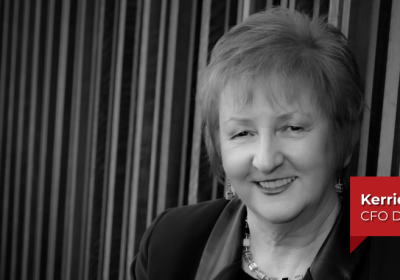
- Author: Richard McBride | Editor
- Posted: March 30, 2023
CFO Spotlight > Christina Katsibouba
CFO Magazine Editor, Richard McBride shines the ‘CFO Spotlight’ on Christina Katsibouba – Group CFO at The Star Entertainment Group. Christina is the first female appointed to the CFO role since the company demerged from Tabcorp in 2011. ASX-listed, The Star Entertainment Group owns and operates The Star Sydney, The Star Gold Coast and Treasury Brisbane. Alongside their partners, The Star are also developing the transformative $3.6 billion Queen Wharf Brisbane project with the vision to become Australia’s leading integrated resort company.
RM – Thank you for joining us today Christina – To set the scene can you share your journey to CFO, what was the pathway, and did you always have CFO aspirations?
CK – Since joining The Star in 2015, I have had a non-traditional path to my current role as CFO.
Although I have worked with and within the finance team, including as Deputy CFO, my first C-Suite role in the organisation was as Group Executive – Gaming. Prior to that, like many in finance, my background has included training across the “Big 4” accounting firms.
I feel privileged to have been appointed as The Star’s first female CFO since the company demerged from Tabcorp in 2011. As a result, I want to ensure I’m paving the way for future female leaders in finance, at The Star and across the tourism, entertainment, and hospitality industries.
I like to believe that everyone has an ambition to leave a certain legacy. For those of us who work in business and large organisations, that may mean building their career towards a leadership role – whether that’s as CFO, CEO or in other management positions.
RM – Who has supported your career the most and how important is your network, especially for women in finance?
CK – Developing a strong network of mentors, advocates and sponsors, both within and outside your organisation, and externally is vital. These are trusted people who you can lean on for guidance or who can simply lend a helpful ear when you need someone to talk to.
In my career I have surrounded myself with people who have played these pivotal roles at all stages, although not necessarily on a formal mentor capacity. Some of them were CEOs or heads of business in other companies and some were people I have met along the way that I really connected with. For women especially, having influential people who can guide you and help connect you with companies is helpful to fill the confidence gap.
RM – It’s well documented that the number of female CFOs in Australia (ASX200 and wider) is low – What can be done to improve this?
There’s plenty of research to demonstrate that there is a pipeline of women in finance, however that does not translate to promotions or senior leadership positions.
The number of women in CFO roles across the ASX200 is low at around 16%. That drops even further to just 6% for female CEOs.
Australia’s gaming industry fairs a little better with one in four women currently appointed as CFO and I’m extremely proud to be part of a cohort helping to break down those barriers and the proverbial glass ceiling.
To address the under-representation of women in senior executive positions requires a multi-faceted approach. These range from simple changes to policies and procedures in recruitment, retention, to developing more rigid systemic changes.
Firstly, it’s fundamental to encourage young girls to pursue STEM subjects in school and supporting them in that time and through university and beyond.
The Star has been on its journey towards gender equity since 2016. As a result of those strides, the company was recognised as an ‘Employer of Choice’ by the Workplace Gender Equality Agency in 2022 and recently ranked fourth overall by global recruitment network Work180 for Australian workplaces for Women.
Some of the initiatives we have adopted as a company and that have clear impacts on the representation of women in senior leadership include:
- Encouraging gender diversity at all levels though initiatives such as targeted recruitment, mentoring and sponsorship programs, and flexible work arrangements to support work-life balance.
- Addressing unconscious biases that may impact on recruitment and promotion decisions through training.
- Creating a supportive culture that offers training and development opportunities, provides networking opportunities, and ensures that women have access to the resources and support they need to succeed.
- Recognising the work, and contribution of women – both in public and private settings that may otherwise go unnoticed.
RM – What advice would you extend to women in Australia with CFO / CEO ambitions?
As you move up the corporate ladder, positions get fewer, while competition becomes more intense. To make it to the top role in finance, it takes more than your ability, training, and previous achievements.
While CEOs have traditionally been borne from finance positions and is the natural progression for a CFO, they are increasingly coming from other business areas such as operations and marketing.
I would encourage all women with those aspirations to challenge themselves, in their current roles and any new roles. When there are opportunities to broaden your skill set in areas you may not be comfortable in, take them. Keep an open mind towards your career trajectory and be adaptable – you can never predict where the next opportunity lies.
Have the courage to take risks and the conviction to make difficult decisions. However, within that, also build resilience for when things don’t go to plan as things can sometimes be out of your control.
RM – Longer term – Where are you looking to most add value and invest this year? (any finance transformations / M&A / culture / projects you can share?)
The Star has faced some public challenges over the last 12-18 months.
However, a new Board and leadership team has committed to a long-term remediation program and towards building a stronger, and more sustainable company.
As part of our remediation, we are investing capital to strengthen our anti-money laundering and risk capabilities as well as our cashless technologies.
The company recently announced an $800 million capital raise which positions the balance sheet for the remediation ahead and provides increased financial flexibility for the ongoing focus of delivering shareholder value.
RM – Covid was a game changer for the way we work – What arrangements do you have in place with flexible working? What works best for you and your finance team?
The Star is a big proponent of flexible work options and creating a family friendly workplace – both for our operational and office-based team members.
We have a variety of formal and informal flexi-work options available from working from home arrangements to industry-leading paid parental leave that includes 16 weeks leave and 18 weeks superannuation for primary carers.
Within the finance department, team members have utilised a variety of these arrangements that suit their individual needs.
As a leader, I think it’s important to recognise that everyone’s situation is different and that they should be given the opportunity to tailor their work around their personal lives and prioritise what’s most important to them.
RM- ESG is now front and centre CFOs with ESG initiatives and reporting gaining momentum – Is sustainability and the wider ESG agenda becoming part of the CFO remit? Can you share some of the ways CFOs can help drive the sustainability and wider ESG agenda? – Any initiatives that you can share?
Delivering on ESG initiatives, while ensuring financial viability is the at the core of every company’s sustainability journey, whilst also being at the core of every CFO’s sustainability agenda.
The two are inextricably intertwined.
CFOs have historically been responsible for delivering financial value and reporting to their stakeholders – including investors, guests and its workforce, however, those same stakeholders are seeking long-term value propositions, including broader impacts on the community and planet.
There are many steps CFOs can take to drive the ESG agenda. These include developing a close working relationship between the finance team and those that have carriage of the organisation’s social responsibility such as understanding current and future ESG reporting requirements to future proof against regulatory changes and understanding the short, medium and long-term financial impact of climate-related physical and transition risks.
In FY2022, The Star redeveloped its sustainability strategy, reassessed its most material ESG issues and commenced the development of a new strategic roadmap, action plan and a series of targets towards 2030. The strategy, titled ‘Responsible Business, Sustainable Destinations’, is aligned to the United Nations Sustainable Development Goals.
This new sustainability strategy is focussed on three pillars – Responsibility, Environment and People and encapsulates The Star’s intent for the current and future management of material and emerging ESG issue areas and increases efforts in several key business impact areas.
A key ESG initiative The Star announced was the purchase of 170-hectare parcel of farmland in South-East Queensland to help manage its future carbon emissions reduction and to support biodiversity and native forest regeneration.
The Star will use the land near Gympie as its first carbon credits project, as well as create a nature-based farm partnering with local farmers and through widescale tree planting support endangered species particularly koalas, with new habitat.
The project took two years to bring to life as an extension of its sustainability strategy and will directly bolster the company’s target of net-zero scope 1 and scope 2 carbon emissions for wholly owned and operated properties by 2030.
The Star will be planting over 100,000 native trees over the next five years to not only generate Australian carbon credit units but also to establish a koala sanctuary and create habitats for local, endangered species.
The Star has also completed initial biodiversity assessments to ensure this regeneration project supports local, native forest cover and it can measure the positive impact over time.
For further insights on The Star Farm view – https://vimeo.com/798562544
RM – For anyone looking to make their next career move in finance – What advice / further education / professional development, or top tips can you extend in securing the top CFO roles in Australia?
As technology impacts the traditional functions of the finance department and accounting becoming increasingly automated, professionals with CFO and C-suite ambitions will need to demonstrate and develop their soft skills across areas such as leadership, communication, and negotiation.
Lastly, being flexible and adaptable to change is becoming an increasingly valuable attribute. CFOs should be able to make decisions in a business and economic climate that is rapidly changing with knowledge and foresight.
By adopting these skills and personal qualities finance professionals will be better positioned to become strategic advisers to the business and evolve beyond the traditional analyst and number crunching roles of their predecessors.








